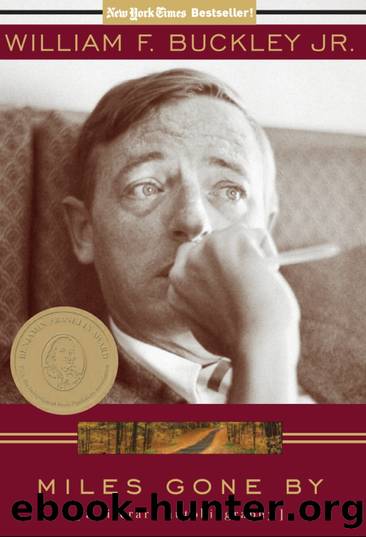Miles Gone By by William F. Buckley

Author:William F. Buckley
Language: eng
Format: epub
ISBN: 9781596983243
Publisher: Regnery Publishing
Published: 2017-11-23T00:00:00+00:00
. . . And a Sixth
This portrait of William A. Rusher, Princeton B.A., Harvard Ll.B., is taken from a toast at a dinner in his honor.
Some of you have known Bill Rusher much longer than I have, although I daresay not so intimately. To know anyone intimately it requires that he have the authority to question your expenditure of money. In this respect I am certain that you will all be glad to know that the guest of honor is the quintessential Republican. I donât mean to say that he is tiresome about it, merely that he is thorough. And unrelenting. Even on Sundays. I remember the legend of Congressman Rich of Pennsylvania, who was elected to the House of Representatives sometime before the First World War, and served there until his death, approximately forty yearsâshould we say long years?âlater. During the first thirty-nine of those years he uttered only a single declamationâthe same declamation, on a dozen or more occasions each year. The debate on a spending measure would take place and, after it became obvious that it would be approved, Congressman Rich would raise his hand and, recognized, would say, âGentlemen, where are we going to get the money?â and sit down. It is recorded that in his declining years, following a debate which had gone on for three weeks and had kept his colleagues at their desks night after night, the moment finally came for a vote on the controversial measure. At which point, nearing midnight, Congressman Rich raised his hand. The entire chamber groaned. But under the rules the Speaker was powerless. Grumpily, he recognized the member from Pennsylvania, who, struggling against his great age, rose to his feet, looked around at his colleagues, and said, âApril fool!â
Bill Rusher is not that versatile.
Our friend is a man of most meticulous habits, and it is a miracle, of the kind which providence less and less frequently vouchsafes us, that he should have endured for so long the disorderly habits of his colleagues. When so many years ago, in 1957, I asked him timidly whether he would consent to accept the responsibilities of publisher, he instinctively reached into his pocket and pulled out his notebook, presumably to see whether his notebook had any objections. Having passed that hurdle, National Review was subjected to a methodical probing over a period of three or four weeks. A few very close friends were directly consulted, and in due course the decision was reached. Shortly after that, he began to impose order on our affairs.
To this end he began his famous graphs. We have graphs at National Review charting every quiver in the organizationâs metabolism. We have graphs that show us how we are doing in circulation, in promotion expenses, in political influence. We have graphs that chart the fidelity to conservative principles of most major, and all minor, public figures in America. We have a graph that will tell you at a glance whether Lauren Bacall is more or less conservative than Humphrey Bogart.
Download
This site does not store any files on its server. We only index and link to content provided by other sites. Please contact the content providers to delete copyright contents if any and email us, we'll remove relevant links or contents immediately.
Cecilia; Or, Memoirs of an Heiress — Volume 2 by Fanny Burney(31956)
Cecilia; Or, Memoirs of an Heiress — Volume 3 by Fanny Burney(31942)
Fanny Burney by Claire Harman(26603)
We're Going to Need More Wine by Gabrielle Union(19046)
Plagued by Fire by Paul Hendrickson(17413)
All the Missing Girls by Megan Miranda(16029)
Cat's cradle by Kurt Vonnegut(15357)
For the Love of Europe by Rick Steves(14121)
Bombshells: Glamour Girls of a Lifetime by Sullivan Steve(14076)
Leonardo da Vinci by Walter Isaacson(13337)
4 3 2 1: A Novel by Paul Auster(12393)
The remains of the day by Kazuo Ishiguro(9000)
Adultolescence by Gabbie Hanna(8927)
Note to Self by Connor Franta(7671)
Diary of a Player by Brad Paisley(7581)
Giovanni's Room by James Baldwin(7346)
What Does This Button Do? by Bruce Dickinson(6207)
Ego Is the Enemy by Ryan Holiday(5450)
Born a Crime by Trevor Noah(5383)
